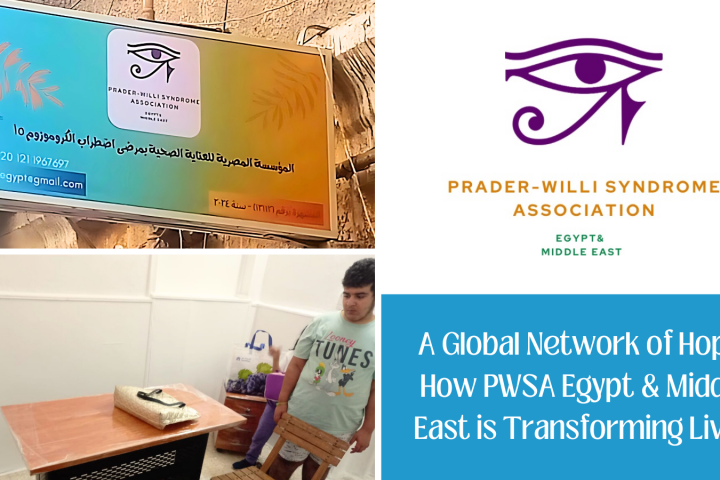Children, and many adults, look forward to Halloween with great anticipation…Bags full of sugary treats, scary decorations, and the thrill of trick or treating with friends and family…What could be more fun? But, what do you do for Halloween when your loved one has Prader-Willi syndrome? Can they safely participate in the festivities? The answer is yes, with planning.
For some kids, trick or treating can cause anxiety (and subsequent meltdowns), even with proper planning. If that is the case with your child, consider these other fun Halloween activities:
- Plan your own costume party so you can control the menu
- Consider having your child dress up to help pass out treats at your door. Remember: Treats do not have to be food; consider trinkets, glow sticks, or even spooky stickers. Participate in the Teal Pumpkin Project https://www.foodallergy.org/education-awareness/teal-pumpkin-project
- Carve or paint pumpkins
- Go on a hay ride
- Watch Halloween movies
If trick or treating is appropriate for your child, taking some time to prepare in advance will make it more enjoyable for everyone.
- Plan costumes and masks carefully, taking into consideration any sensory needs your child has.
- It takes a little planning ahead, but some parents and caregivers have found it helpful to deliver non-food treats to neighborhood homes before Halloween. An attached note describes PWS and requests neighbors hand out the provided treat to the child with PWS when he or she visits the neighbor’s home for trick or treating.
- Make and discuss rules regarding candy collection, consumption and disposal. For example, “You can have two pieces of candy today, one tomorrow, then we will give the rest to the church.”
- Determine ahead of time how many houses you will visit and tell your child. Consider doing a practice walkthrough a few days before Halloween.
- Discuss all the possible scenarios: a large spider or skeleton in a neighbor’s yard might move; the person who opens a neighbor’s door might be wearing a costume; other children might be wearing scary costumes, or there might be scary music playing. Talking about “scary” things ahead of time can help alleviate anxiety making the holiday more fun for everyone.
- When trick or treating, give a treat to the person opening the door rather than taking one.
No matter how you choose to celebrate Halloween this year, we wish you a safe and happy one!





 Perry A. Zirkel has written more than 1,500 publications on various aspects of school law, with an emphasis on legal issues in special education. He writes a regular column for NAESP’s Principal magazine and NASP’s Communiqué newsletter, and he did so previously for Phi Delta Kappan and Teaching Exceptional Children.
Perry A. Zirkel has written more than 1,500 publications on various aspects of school law, with an emphasis on legal issues in special education. He writes a regular column for NAESP’s Principal magazine and NASP’s Communiqué newsletter, and he did so previously for Phi Delta Kappan and Teaching Exceptional Children. Jennifer Bolander has been serving as a Special Education Specialist for PWSA (USA) since October of 2015. She is a graduate of John Carroll University and lives in Ohio with her husband Brad and daughters Kate (17), and Sophia (13) who was born with PWS.
Jennifer Bolander has been serving as a Special Education Specialist for PWSA (USA) since October of 2015. She is a graduate of John Carroll University and lives in Ohio with her husband Brad and daughters Kate (17), and Sophia (13) who was born with PWS. Dr. Amy McTighe is the PWS Program Manager and Inpatient Teacher at the Center for Prader-Willi Syndrome at the Children’s Institute of Pittsburgh. She graduated from Duquesne University receiving her Bachelor’s and Master’s degree in Education with a focus on elementary education, special education, and language arts.
Dr. Amy McTighe is the PWS Program Manager and Inpatient Teacher at the Center for Prader-Willi Syndrome at the Children’s Institute of Pittsburgh. She graduated from Duquesne University receiving her Bachelor’s and Master’s degree in Education with a focus on elementary education, special education, and language arts. Evan has worked with the Prader-Willi Syndrome Association (USA) since 2007 primarily as a Crisis Intervention and Family Support Counselor. Evans works with parents and schools to foster strong collaborative relationships and appropriate educational environments for students with PWS.
Evan has worked with the Prader-Willi Syndrome Association (USA) since 2007 primarily as a Crisis Intervention and Family Support Counselor. Evans works with parents and schools to foster strong collaborative relationships and appropriate educational environments for students with PWS. Staci Zimmerman works for Prader-Willi Syndrome Association of Colorado as an Individualized Education Program (IEP) consultant. Staci collaborates with the PWS multi-disciplinary clinic at the Children’s Hospital in Denver supporting families and school districts around the United States with their child’s Individual Educational Plan.
Staci Zimmerman works for Prader-Willi Syndrome Association of Colorado as an Individualized Education Program (IEP) consultant. Staci collaborates with the PWS multi-disciplinary clinic at the Children’s Hospital in Denver supporting families and school districts around the United States with their child’s Individual Educational Plan. Founded in 2001, SDLC is a non-profit legal services organization dedicated to protecting and advancing the legal rights of people with disabilities throughout the South. It partners with the Southern Poverty Law Center, Protection and Advocacy (P&A) programs, Legal Services Corporations (LSC) and disability organizations on major, systemic disability rights issues involving the Individuals with Disabilities Education Act (IDEA), Americans with Disabilities Act (ADA), and the federal Medicaid Act. Recently in November 2014, Jim retired.
Founded in 2001, SDLC is a non-profit legal services organization dedicated to protecting and advancing the legal rights of people with disabilities throughout the South. It partners with the Southern Poverty Law Center, Protection and Advocacy (P&A) programs, Legal Services Corporations (LSC) and disability organizations on major, systemic disability rights issues involving the Individuals with Disabilities Education Act (IDEA), Americans with Disabilities Act (ADA), and the federal Medicaid Act. Recently in November 2014, Jim retired.